Category Archives: Announcements
Keep in contact with De Partu
We are keen to keep in contact with you … however …
The new General Data Protection Regulation (GDPR), which comes into force on May 25th 2018, requires that De Partu provide its members and “followers” with specific details of the personal information that is held on record about them, and obtain explicit, current consent for specific uses of that information for communication purposes.
We have provided you with an online form to indicate your communication preferences, which will take you only a matter of seconds to complete and submit. It applies both to members and to “followers”. So please don’t drop off the radar; complete it today!
Fuller information about De Partu’s use of personal data is given in its Data Privacy Notice, q.v.
N.B. A technical problem with this form, which meant that only one of the options could be selected, has now been rectified – 16/05/2018
New image gallery for the De Partu website: launch of an appeal for images of midwives’ badges
Wouldn’t it be timely to compile a gallery of as many former midwifery ‘training’ school badges as possible, before they are lost? Former schools of midwifery often produced their own badges, sometimes with interesting coats of arms or mottos on them. We have made a start with this: members can view them in our image library. Has this tradition of awarding badges been continued by contemporary higher education institutions? …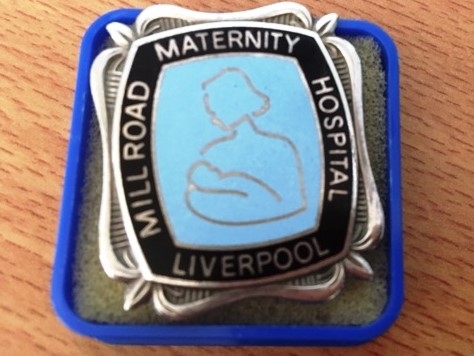
Study day: Education for practitioners and prospective parents during the twentieth and early twenty-first centuries
Trinity College, Oxford
May 5th 2018
This study day is part of the Knowledge Exchange Partnership between The Oxford Research Centre in the Humanities (TORCH), the De Partu History of Childbirth Group, and the Royal College of Obstetricians and Gynaecologists. The day will focus on the history of midwives’ and obstetricians’ professional education and ways of working together, and aspects of the history of parent education. The programme will include several PhD student presentations.
Details of the programme, and of nearby parking and accommodation, are available on the Events page.
Books for sale
Books for sale
De Partu is currently holding an online sale of secondhand and rare books to raise funds for the Jean Donnison History of Childbirth Student Essay Prize. They include potentially useful primary and secondary sources for historical research which are becoming increasingly difficult to obtain, some being out of print. The prices have been checked, and aim to be competitive. All books may be purchased from Amazon via the De Partu ‘store’.
Victorian values: an image of the Virgin Mary bottle feeding!
York Minster Nave: Nativity boss (1840)

The Nativity Boss
York Minster was built between 1220 and 1472 and is one of the great Gothic cathedrals of England and Europe. In the course of the last two centuries, it has suffered three catastrophic fires with the second, in 1840, destroying the roof of the nave.
The nave roof is decorated with a series of eight bosses that depict the life of the Virgin Mary, a figure of great devotion in Catholic Christendom during the medieval period. The second of the bosses depicts the nativity, the birth of Christ in a stable in Bethlehem. The original boss showed a magnificent ox and ass, a shepherd, angels, the manger and, at the centre, the seated figure of the Virgin with her eyes raised to heaven, breastfeeding the infant Jesus.
In 1834, a local artist, John Browne, made detailed sketches of the nave bosses during maintenance work in the Minster. These sketches were the primary source for the huge restoration that took place following the 1840 fire. All the bosses were restored exactly as Browne had depicted them, except for the nativity boss. Apparently, in response to Victorian preferences for extreme modesty in social settings and church adornments, the restored boss depicted the Virgin bottle-feeding her baby, rather than breastfeeding!
Kindly contributed by Professor Mary Nolan, who is also an official York Minster guide.
Book review: Rossini – A history of adoption in England and Wales: 1850-1961
 |
Rossini, Gill (2014) A history of adoption in England and Wales: 1850-1961 Barnsley: Pen and Sword £19.99; $39.95 9781781593950 “This thoughtful book is well worth reading for anyone interested in social history” Reviewed by Dr Lindsay Reid Other book reviews |
Midwifery records of Midwife Booth of Salford
Midwife Booth, a Salford midwife, attended over 4,225 cases (1864-1879). Ellen Booth practised in the environs of Salford during the nineteenth century. Data provided in this register suggests that she attended over 4,225 births between 1864 and July 1879. From the figures listed in the front of the book, her birth attendances were lowest in the first few years of practice, which happened to coincide with the latter years of the Lancashire Cotton Famine (1861-65). The surviving casebook lists births from 1873 until July 1879, and shows a year-on-year increase in midwifery activity.
The format of the individual birth records evolved slightly over time, but contained details of the mother’s name and address, the day and month of the year, and the sex of the child (or children), and it was noted if it was the mother’s first baby. The numbers of births for each completed year were totalled, and interestingly, at the back of the book, she also kept notes of some of the fees charged and any amounts that remained outstanding. Although there is a slight inconsistency in the style of the records towards the end, births were predominantly described as ‘natural’, and there are relatively few cases in which medical attendance was summoned.
The medical cases begin to appear towards the end of the register; in one case a Dr Winterbottom was called to perform an ‘instrumental’ birth, two more cases are described as ‘natural instrumental’, and in 1879 there was an instrumental birth of a stillborn infant boy. A significant number of infants were born ‘face to pubis’ and Mrs Booth encountered several breech births (one footling), plus face presentations and sets of twins, which were all born without apparent difficulty . Complications noted included several retained placentae, an ‘emerage’ (haemorrhage) before birth, which resulted in a natural birth, and one ‘emerage’ after birth, with no mention of her calling for medical assistance. There were also references made to miscarriages as well as stillbirths.
Several babies were described as malformed, and prematurity was noted; one premature baby was recorded as living for 20 hours (incidentally, none of the babies appear to have been weighed at this time). Towards the end of the register, a maternal death is documented which occurred at the onset of labour, apparently due to ‘rupture of the heart’.
These archives are from the Craig Brisbane Collection, and were brought to the attention of De Partu via Manchester Museum. Group member Dr Frances Badger has already completed a study of a similar birth register which contains details of over 5000 births between 1847 and 1875, kept by a midwife called Mary Eaves of Spon End, Coventry. The archives have now been transferred to her for a closer examination and investigation.
Dr Frances Badger -thesis abstract
Frances’s article on Mary Eaves may be of interest:
Badger, Frances J. Illuminating nineteenth-century English urban midwifery: the register of a Coventry midwife. Women’s History Review 23(2014) 683-705
Book review: Read – Maids, wives, widows: exploring early modern women’s lives 1540-1740
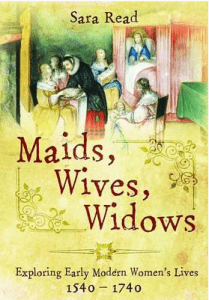 |
Read, Sara (2015) Maids, wives, widows: exploring early modern women’s lives 1540-1740 Barnsley: Pen & Sword ISBN: 9781473823402 “A lively exploration of the everyday lives of women in early modern England from 1540-1740” Reviewed by Dr Julia Allison Available directly from the author via her website sararead.co.uk for £5.00 + p&p |
De Partu meeting May 26th-27th 2017: programme now available
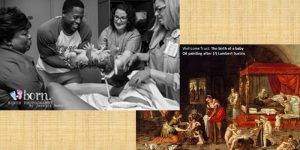 |
De Partu meeting in York Friday May 26th p.m. and Saturday May 27th York Explore Library Saturday £25.00 – includes refreshments Download programme Register via Eventbrite Recommendations for accommodation Map of York city centre |
Book review: Christensen – The Popish midwife (2016)
 Terri Coates’ review of Annelisa Christensen’s historical novel, The Popish midwife, is now available. It is based on the life of the 17th-century Roman Catholic midwife Elizabeth Cellier.
Terri Coates’ review of Annelisa Christensen’s historical novel, The Popish midwife, is now available. It is based on the life of the 17th-century Roman Catholic midwife Elizabeth Cellier.
The book is available from Amazon and all good bookshops. It is also available on Kindle and directly from The Conrad Press website.
The author’s blog discusses her inspiration for writing the book: The Popish midwife (why I wrote her story).
We are looking forward to debating “creative non-fiction” and historical veracity at our forthcoming meeting in York.
De Partu event at York 26th-27th May 2017 – call for papers
Willughby on midwives…
‘I desire that all midwives may gain a good repute, and have a happy successe in all their undertakings: and that their knowledge, charity, and patience, with tender compassion, may manifest their worths among their women, and give their women just cause to love, honour, and to esteem them.’
Percivall Willughby (1596-1685)
Willughby, P., & Blenkinsop, H. (1863). Observations in Midwifery, as also the Country Midwifes Opusculum or Vade Mecum … Edited from the original MS. by Henry Blenkinsop. Warwick: H. T. Cooke & Son, p. 12 (full text available online)
Jean Donnison (1925-2017)
It is with deep sadness that we announce the death of Dr Jean Donnison on January 27th, after a long period of declining health during which she bravely continued to work and publish. Jean will be known to many members for the significant contributions that she made to midwifery history, in particular her classic work Midwives and medical men: a history of the struggle for the control of childbirth, first published in 1977, which is still highly cited. Jean wrote a small feature for De Partu, The office of midwife – some historical background.
Readers are invited to add their own tributes to Jean via the comments function. They are also invited to make a donation in her memory to Maternity Worldwide via JustGiving. Maternity Worldwide is a charity saving lives in childbirth by training midwives, providing community maternal health promotion and improving access to health.
 |
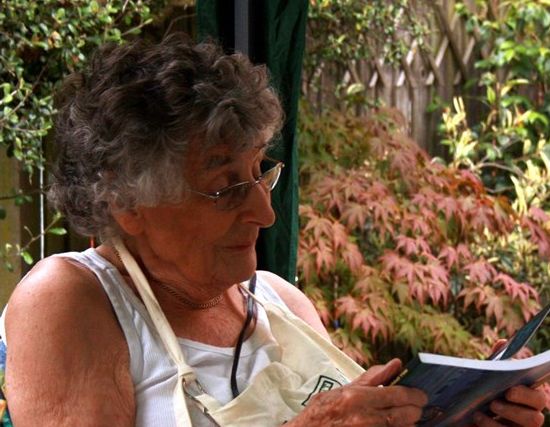 |
Ethelred the Unready’s gift to parturient women: an agate touch-stone said to ease childbirth
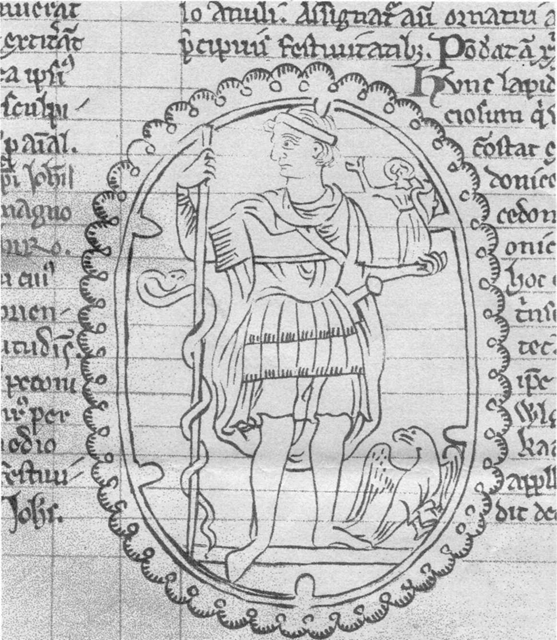
From British Library, Manuscript Cotton Nero D i, f.l46v Enlarged so as to represent probable dimensions of original stone.
Read here the full version of Professor Michael Swanton’s article:
Ethelred the Unready’s gift to parturient women: an agate touch-stone said to ease childbirth
Professor Swanton is Emeritus Professor of Medieval Studies at the University of Exeter.

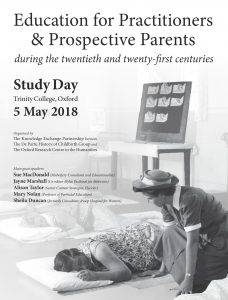
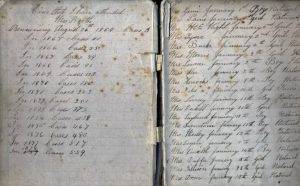
 De Partu history of childbirth event
De Partu history of childbirth event